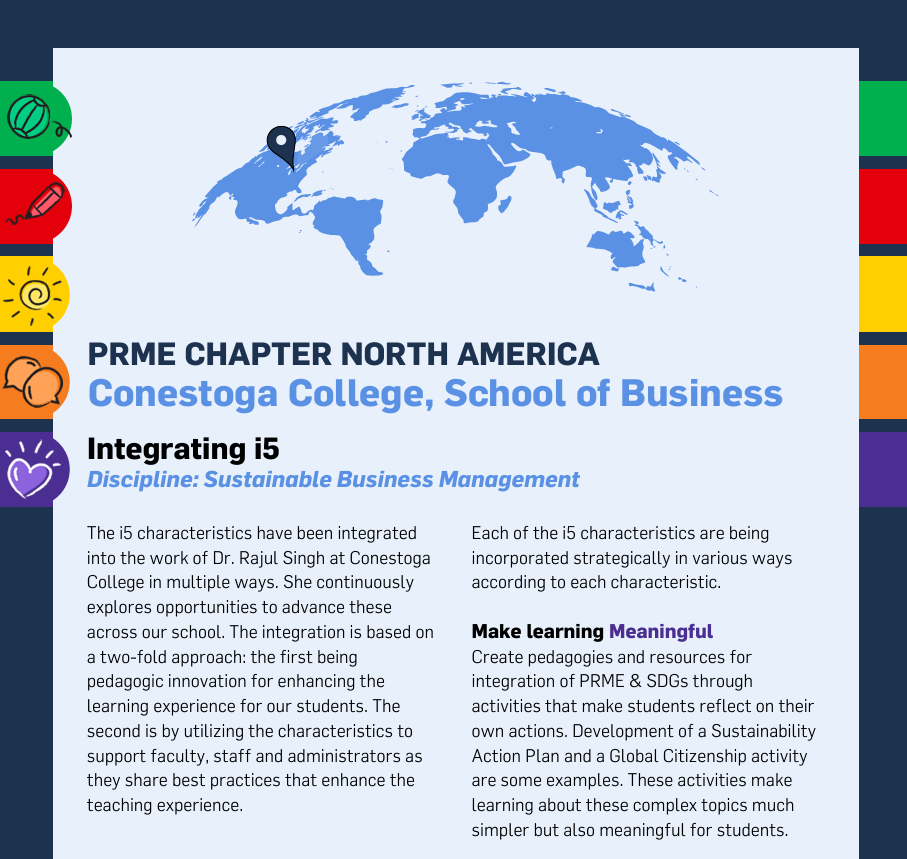Conestoga’s School of Business and professor Rajul Singh are featured in the latest Principles for Responsible Management Education (PRME) viewbook, which shares impactful ways to teach students about Sustainable Development Goals (SDGs).

Conestoga’s School of Business and professor Rajul Singh are featured in the latest Principles for Responsible Management Education (PRME) viewbook, which shares impactful ways to teach students about Sustainable Development Goals (SDGs).
The Impactful Five (i5) Viewbook contains examples of PRME signatory schools from around the world - which includes Conestoga - putting the i5 framework into practice through classroom engagement, providing examples of activities and insights to help educators enhance teaching methodologies and foster a dynamic learning environment for their students.
The i5 framework is a holistic approach to teaching: make learning meaningful, foster joy and well-being, develop supportive social interaction, facilitate active engagement and design for iteration.
The May 2024 edition highlights Singh’s classroom activities to engage students as well as the Open Access Teaching Case Journal (OATCJ) at Conestoga.
Singh said she is honoured to see Conestoga and her teaching practices showcased in the new viewbook, an invaluable resource which has inspired her to make more intentional interconnections between teaching pedagogy and the i5 framework to simply complex topics.
“The i5 Viewbook is an educational resource with a global outreach and supports educators from the PRME community of more than 800 management institutions. It shares best practices for simplifying learning and demonstrates how educators can engage with the i5 characteristics and transform education through meaningful, joyful, social, active and iterative learning,” Singh said.
“As a sustainable business educator, I have always used creative ways of engaging students to support student learning through active learning strategies, including interactive lectures, simulations, case studies and field visits because they provide a dynamic learning environment.”
Singh’s teaching focuses on the impacts of global economic, social and environmental challenges on business and exploring solutions. Finding ways to help students understand these issues is vital to enhance their potential to become responsible leaders committed to making a positive impact.
“Topics like these are complex to understand and for visualizing how businesses can be a solution provider for these global challenges, innovative teaching methods are imperative.”
The Open Access Teaching Case Journal created by the School of Business publishes teaching case studies in all disciplines that are aligned with the United Nations-supported PRME by offering a repository of quality, real-world teaching cases that are free and accessible to all. These cases are intended for use in the classroom and aimed to engage students in active discussions focused on analysis of relevant problems through a variety of course frameworks, making learning meaningful and relevant.
Editor-in-chief Jane Gravill is thrilled the journal could contribute to the viewbook as its vision supports the SDGs, including two goals of quality education and reduced inequalities.
“The impact of the OATCJ on the student learning experience through the use of accessible cases in the classroom increases meaningful learning as well as active engagement and inspires increased social interaction between students as they work together to discuss alternatives to address the case problems, thereby developing essential social skills too,” Gravill said.
Amanda Di Battista, chair of Scholarship & Community and PRME Lead in the School of Business, commended the many Conestoga employees who are incorporating i5 principles and the recognition the college is receiving for its ongoing efforts. The college’s new micro-credential on PRME integration was featured in the 2023 viewbook.
“We are very proud that Conestoga has been featured again this year in the i5 Viewbook and that so many of our faculty are putting the i5 Framework into practice in their teaching and scholarly work,” Di Battista said. “We are pleased to provide ongoing opportunities for faculty to build capacity for using the i5 Framework to innovate in their classrooms through the PRME Integration Micro-credential offered by Teaching & Learning and look forward to continuing to find new ways to support sustainable and responsible management education at Conestoga College.”
